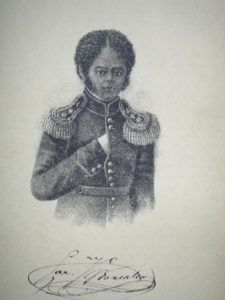
Lorenzo Barcala
*Lorenzo Barcala was born on this date in 1793. He was an Afro Argentine military commander who participated in the Argentine civil wars on the side of the Unitarian Party. He was one of the few Black soldiers to reach the rank of colonel in that country.
The son of slaves from Mendoza, Argentina, he was also a slave during his childhood. He was released by the governor of Cuyo, General José de San Martín, but for unknown reasons, did not join the Army of the Andes. He began his military career in 1818 as a soldier of the Regiment of Pardos ("mulattoes"). In 1820, he participated in the turmoil produced by the so-called Anarquía del año 20, which had one of its epicenters in Cuyo.
He was part of the army of General Bruno Moron, who fought against Chilean General José Miguel Carrera, and after the death of Moron, fought in the battle of Punta del Medano under orders of José Albino Gutierrez. In 1824, he participated in a failed attempt against Governor Gutierrez and fled to San Juan. Back in Mendoza, he joined Colonel forces in a second uprising against Gutierrez, this time successful. Shortly afterward, he suppressed the "ecclesiastical" revolution in San Juan and the overthrow of Governor Salvador María del Carril.
In 1826, Barcala joined the army that fought in the War of Brazil under the command of Colonel Ramon Bernabe Estomba and was taken prisoner. He spent several months in a prison in Rio de Janeiro, with the constant threat of being sold as a slave until he was released in a prisoner exchange. Barcala joined the campaign of General José María Paz against the federal interior in 1829. Under his command, he fought in the Battle of San Roque, near today's vacation city of Villa Carlos Paz. Barcala was commissioned to organize an infantry battalion of Afro Argentines, freedom: too expensive freedom, to be paid with many years of service in the army.
He was loved by the people of African descent mainly because he denounced the humiliation as outrageous compared to what they suffered. He was a battalion commander at the battles of La Tablada, after which he was promoted to Lieutenant Colonel, and Oncativo, after this victory, was promoted to colonel and sent as second in command of the occupying army of Mendoza, whose commander was José Videla Castillo.
He was appointed governor and remained at the forefront as chief of Barcala. He fought in the Battle of Rodeo Chacon as head of a cavalry wing against the forces of Facundo Quiroga, who beat them relatively quickly. He protected Castillo, retreating northward, where they joined the chief of the Confederation League. He followed this army until their final defeat at the Battle of La Ciudadela of Tucumán.
After the battle, Facundo Quiroga shot most of the officers but decided to spare Barcala's life and appointed him chief of staff. When Quiroga retired from military activities and settled in San Juan, Barcala settled there. He joined Rosas' military campaign in 1833 against Indigenous tribes and fought against the Ranqueles of chieftain Yanquetruz in the battle of Acollaradas. Quiroga was assassinated, and there were conflicts between Aldao, Mendoza, Martín Yanzón, governor of the San Juan province, and Tomas Brizuela of La Rioja.
When Aldao attempted to escape from a conspiracy that led Barcala from San Juan, the plot was discovered, and its leaders arrested and executed Mendoza. After the danger, Aldao - who was not the governor but the army chief - demanded the extradition of Barcala. Domingo de Oro, who was involved in the matter, decided to save his own life by handing Barcala over. After a trial lasting a month, Barcala was sentenced to death and shot in Mendoza in August 1835.
Edelmiro Mayer, an Argentine officer in the Union Army, mentioned Lorenzo Barcala in an article he wrote for Harper's Magazine in 1863 as an example of the role played by African slave descendants in the South American independence wars and the Cisplatine War.